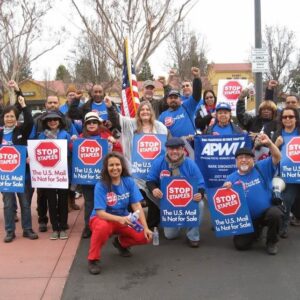March 1, 2018
Here We Go Again!
(This article first appeared in the March-April 2018 issue of the American Postal Worker magazine)
By Motor Vehicle Service Craft Directors
To quote the famous New York Yankee legend Yogi Berra, “It’s déjà vu all over again.” As we prepare for the opening of the 2018 Collective Bargaining Agreement negotiations, we can be certain that the USPS will once again expect the union, or an interest arbitrator, to concede the many years of benefits we have obtained for APWU members. This USPS textbook move has been used over and over again in their attempt to put the union on defense and not offense. Being mindful of this strategy, the APWU’s leadership remains focused on protecting and improving the rights of our members.
The membership will play an important part now more than ever as the union moves forward in preparing, and ultimately reaching a new Collective Bargaining Agreement. Your role as a member is to stay involved, submit resolutions for changes to the contract and remain informed on the issues affecting the Motor Vehicle Service Craft.
Labor Cost Rates
The amounts, cost and other charges that the USPS affixes to their employees when making the decision of performing the work in-house versus subcontracting remains unclear to the Motor Vehicle Service Division. In Postal Vehicle Service and Vehicle Maintenance Operations – despite numerous requests for information, National Labor Relations Board (NLRB) charges and Step 4 disputes – the USPS has not yet fully disclosed the components included in fully loaded labor costs. Our position remains that the Contracting or Insourcing of Contracted Service Memorandum of Understanding requires full disclosure by the USPS of the costs.
The APWU has repeatedly requested the Postal Service to provide the union with the “National Average Labor Rates” for 2016 and 2017, and recently received the rates for 2016 (can be viewed on apwu.org). The idea of doing a cost comparison without a labor rate flies in the face of doing a fair comparison of all reasonable costs. In addition, the union is seeking a better understanding of how certain benefits are being allocated by the USPS to the service wide cost, and used to increase overall bargaining unit cost. We will remain vigilant during 2018 in obtaining VMF Labor Cost Methods and their use to subcontract vehicle maintenance work.
DSI Dispute Settled
On Nov. 22, 2017, the MVS Division settled a longstanding grievance, QOOV-4Q-C 05171465, regarding upgrading the Driver Safety Instructor (DSI) positions. In the dispute, the union’s grievance sought to upgrade the DSI one level higher than the Tractor Trailer Operator (TTO).
When the Motor Vehicle Operator and TTO positions were upgraded in the mid-2000s, the Driver Instructor Examiner (DIE) remained at the same level and did not receive an upgrade. In 2007, the DIE position was abolished and the DSI position was created. For many years, this left the positions ranked at the pre-2005 level. This disparity caused unintended consequences. If a TTO desired to become a DSI, this resulted in a demotion for the TTO. This mid-term upgrade restores parity with the TTO and reestablishes the appropriate level for the DSI.
Security at Network Distribution Centers
The APWU initiated a dispute at the Network Distribution Centers in 2015; we also contacted the Office of Inspector General who conducted an audit at 11 NDCs. The OIG found, based on report HR-AR-18-001, that the Postal Service and Postal Inspection Service did not always effectively address and monitor security deficiencies. Some of the deficiencies included obstructed, damaged, or inoperable gates, fences, doors, locks and closed-circuit television systems.
The OIG said that, “These conditions occurred because internal controls were not sufficient to ensure responsible security and area officials effectively addressed, monitored, and communicated security deficiencies or conducted VRAT assessments, as required…When security deficiencies are not timely addressed or VRAT assessments are not conducted as required, there is an increased risk to the safety and security of Postal Service employees, customers, the mail, and other assets.”
This issue was first raised by members attending the BMC Conference. We must remain vigilant to ensure a safe workforce in all buildings.

